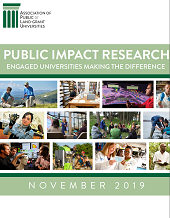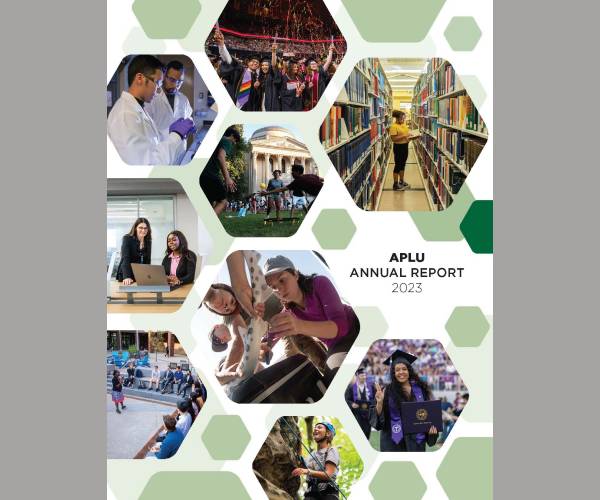Public Impact Research
APLU Impact
- APLU recommends using Public Impact Research (PIR) as a broad label to describe how university research impacts society.
- A Public Impact Research Activation Guide will help university leaders emphasize the value of collaborative research with communities, providing best practices, fresh ideas, and recommendations for presidents, chancellors and provosts; research leaders; communications and marketing leads; writers and content creators; and researchers and scholars.
- APLU created a searchable database of university PIR examples. APLU invites member universities to submit stories of research with public impact.
APLU’s Public Impact Research working group recommends using PIR as a broad label to describe how university research improves lives and serves society—locally, regionally, nationally, and globally. Using PIR consistently along with fundamental discovery and training the next generation workforce communicates powerfully to the public the value of university research and could help restore public trust in our institutions.
In November 2019, APLU unveiled its initial Public Impact Research: Engaged Universities Making the Difference report. The report included work by more than 60 university leaders. Drawing on the group’s work, the report issues five action steps for the public university community and stakeholders to advance public impact research (PIR). Several appendices to the report are currently under final development. They will be added to this page as soon as they are finalized.
Public Impact Research Activation Guide
What is public impact research and why does it matter? Public impact research (PIR) is any research that benefits the public. This may include everything from developing new medications or understanding environmental challenges to examining disparities in education access and economic development.
Our universities were founded specifically to benefit the public, and the research that public and land-grant universities produce serves this need. Now, more than ever, we need to elevate and communicate the impact that public university research has on everyday life. We also need to emphasize the value of collaborative research with communities—not just about communities.
This Activation Guide provides best practices, fresh ideas, and specific recommendations for presidents, chancellors and provosts; research leaders; communications and marketing leads; writers and content creators; and researchers and scholars. Please click on the headings below to expand each section as needed.
Furthering PIR requires close collaboration with others in different roles. This guide may have broad applications across your university, including with colleagues in government relations, advancement, and other areas. We encourage you to share this page as you see fit.
Submit Your Research Examples
Learn how to include your PIR examples in APLU’s PIR database.





Stay Connected
X (formerly Twitter)
Facebook
YouTube
LinkedIn
RSS